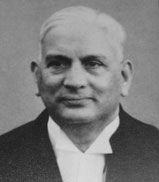
Meet Justice Ghulam Hasan and his Notable Judicial decisions
Justice Ghulam Hasan (1889–1954) was among the early judges of the Supreme Court of India, serving from September 8, 1952, until his death on November 5, 1954. Prior to his elevation, he was the Chief Judge of the Oudh Chief Court and later a judge of the Allahabad High Court after the courts were amalgamated. Justice Hasan’s judicial career was marked by a commitment to fairness, clarity, and the development of foundational principles in Indian law during the formative years of the Supreme Court.
Judicial Career and Philosophy
Justice Hasan was known for his deep legal acumen and balanced approach. His experience as Chief Judge of the Oudh Chief Court and as a sessions judge in Uttar Pradesh gave him a strong grounding in both civil and criminal law. On the Supreme Court, he was part of the “Sastri Court,” which laid down several precedents in constitutional and civil law. Hasan’s judgments reflected a careful balance between individual rights and state interests, and he was respected for his scholarship and integrity.
Landmark Judgments
While specific landmark judgments solely authored by Justice Hasan are not widely cited in contemporary literature, his contributions as part of the early Supreme Court benches were significant in shaping Indian jurisprudence. Some notable aspects of his judicial work include:
1. Constitutional Interpretation
Justice Hasan participated in benches that addressed the interpretation of the newly adopted Indian Constitution. These cases set the groundwork for the protection of fundamental rights, the scope of judicial review, and the balance of power between the legislature and the judiciary.
2. Civil and Criminal Law
His experience in the Oudh Chief Court and Allahabad High Court meant he contributed to important decisions on property rights, succession, and criminal procedure. His judgments often emphasized procedural fairness and the necessity of evidence-based convictions.
3. Administrative Law and Federalism
Justice Hasan was involved in early cases that clarified the powers of state and central governments, helping to define the contours of Indian federalism in the post-independence era.
Legacy
Justice Ghulam Hasan’s tenure, though relatively brief, coincided with a critical period in India’s legal history. He helped shape the Supreme Court’s approach to constitutional interpretation, civil liberties, and the rule of law. His judgments and participation in foundational benches contributed to the evolution of Indian jurisprudence and the establishment of the Supreme Court’s authority in safeguarding the Constitution. Justice Hasan is remembered as a jurist who brought depth, fairness, and a sense of duty to the bench during the early years of India’s Supreme Court.












comments